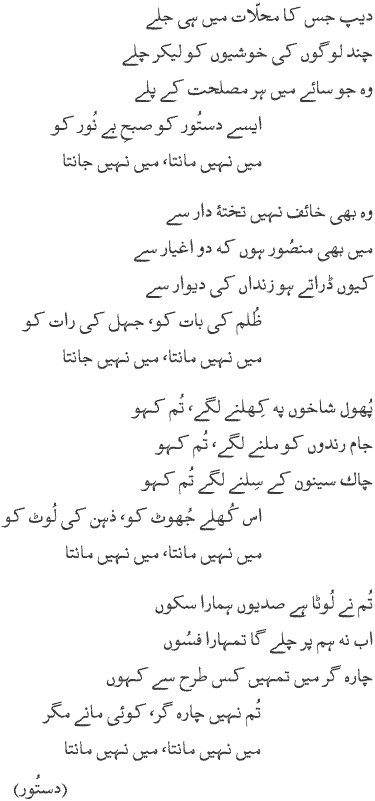Habib Jalib
“No poet since Wali Dakkani has been able to capture greater audience than Habib Jalib. He is truly the poet of the masses..” [Faiz Ahmed Faiz]
The history of Pakistan is flooded with compromises, plaguing every segment of society including politicians, judges, bureaucrats, scholars etc. We as a people have managed to secure an ultrastrong “digestive system” for tyranny, injustice, and other social excesses. Our sociocultural decay thus is not by accident but rather a consequence of this indifference, among many other factors.
A few personalities in history however have shied away from this common disposition, showing zero tolerance for the above mentioned ills. Habib Jalib, a renowned Urdu poet and political activist, is among those exceptions who stand out from the rest.
Habib Jalib was born in 1928 in Hoshiarpur, East Punjab. He migrated to Pakistan after partition and worked as a proof reader in Daily Imroze, Karachi. He enjoyed a very simple and humble life. He was a progressive writer and soon started to grab the audience with his enthusiastic recitation of poetry. He wrote in plain language, adopted a simple style and addressed common people and issues. But the conviction behind his words, the music of his voice and his emotional energy coupled with the sensitivity of the sociopolitical context is what stirred the audience.
Jalib's poetry entered another phase as Pakistan drifted away from democracy with the imposition of Martial Law by General Ayub Khan, the first military dictator of Pakistan. He vigorously opposed military rule, denied the convenient “law of necessity”, and challenged the dictatorial policies both through his poetry and political activism. In “recognition” of his sociopolitical services he was rewarded with imprisonment by the Ayub Khan’s regime. He continued to receive this treat throughout his life at the hands of various governments, both military and civil. He was not a “darbari” poet and seemed like an “opposition leader” to all governments.
The popularity of Habib Jalib surged up tremendously after his poem “Dastoor” (the Constitution) which he wrote in response to the imposition of a “new” constitution by General Ayub Khan, in June 1962. The constitution was a turning point in our history which derailed Pakistan from parliamentary democracy towards a dictatorial and autocratic “presidential rule” of Field Marshal Ayub Khan.
Habib Jalib defied the constitution in the following words:

In 1964, Jalib actively supported Ms. Fatima Jinnah in her presidential campaign against Ayub and wrote another famous poem on Ms. Jinnah.
When Zulfiqar Ali Bhutto came to power, it was assumed that Jalib would enjoy some peace because of similarities between his sociopolitical views (anti-capitalism) and the PPP manifesto. This was however not to be. As Bhutto grew more powerful in the wake of the weakened military after the surrender of Dhaka, the gap between the PPP manifesto and the government policies grew wider. Jalib turned his voice against the Bhutto government and was jailed as before.
When Bhutto was hanged by another military dictator, General Zia-ul-Haq, Jalib wrote a poem against the “justice” of the military ruler, thereby initiating another thread of confrontation against the new military rule. He actively participated in the movement for the restoration of democracy and faced hardships from the Zia regime, and was once again sent to jail.
Habib Jalib was not a spectator, but an active player. His poetry reflects the pulse of the masses. He was a true “representative” of the people of Pakistan, especially the oppressed masses. He wrote on diverse topics, personalities, events, and ills of the society. He used his poetry as a tool to fight against social injustice, opression and abuse of power etc.. His poetic works when viewed collectively, seem like the sociopolitical timeline of Pakistan.
Despite his meager and irregular income, Jalib never compromised on principles and values and continued his struggle for freedom, justice and humanity till his death on March 12, 1993.
See also: Zulm Rahay Aur Amn Bhi Ho - A Poem by Habib Jalib
For more information on Habib Jalib, see:
Jalib Nama: Habib Jalib ki Siyasi Shairi, Jang Publishers
Remembering Habib Jalib
Habib Jalib, Wikipedia
Habib Jalib, Opentopia
 MENU
MENU
